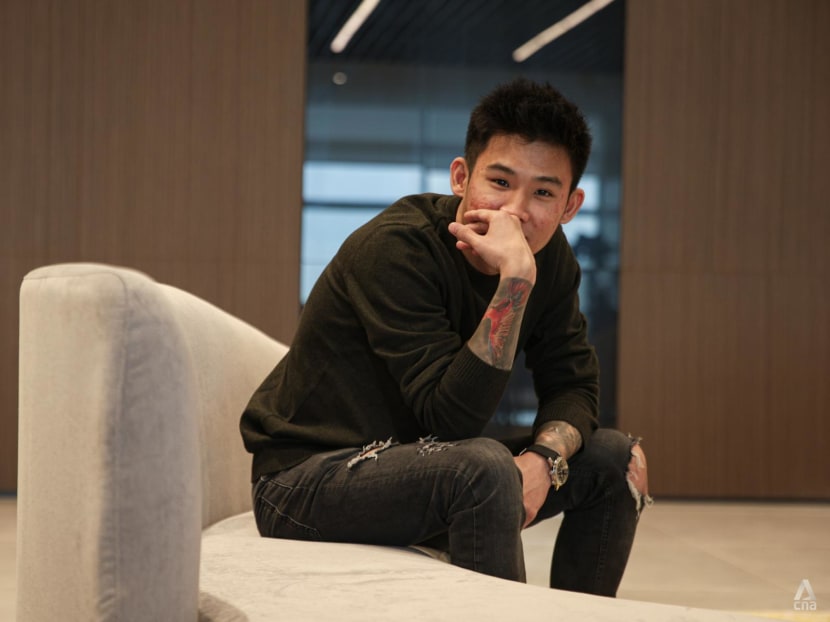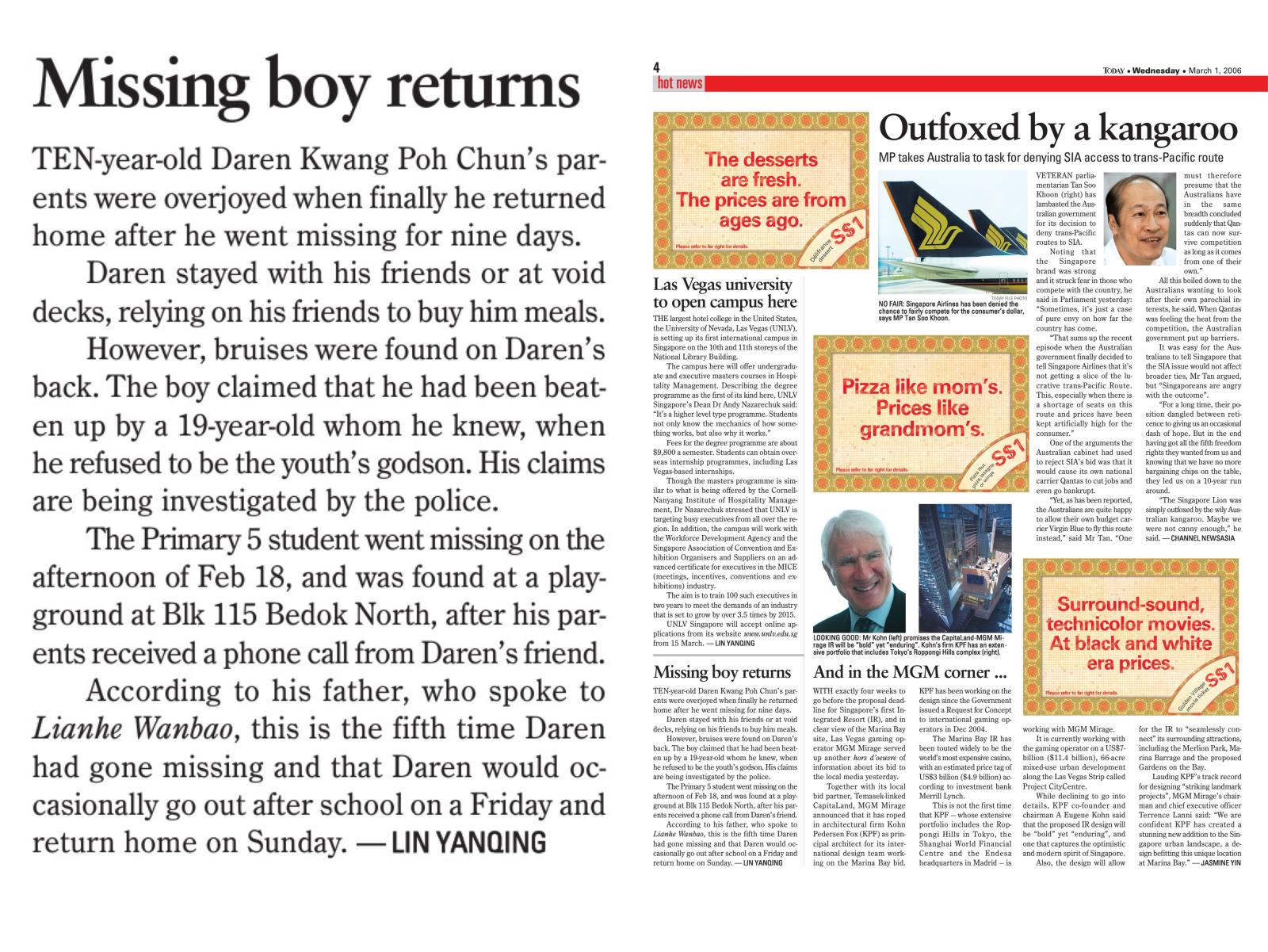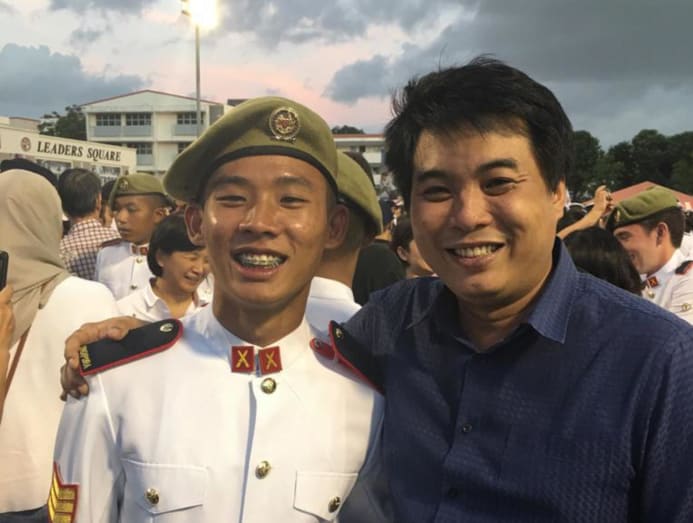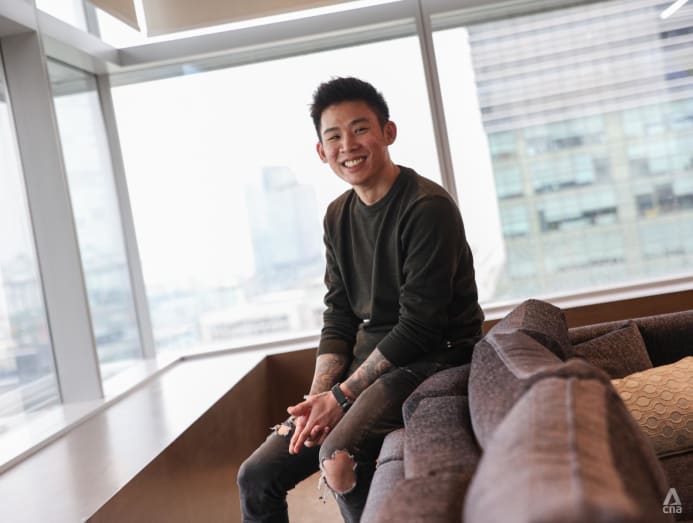'Support is there if you reach out': Ex-delinquent wept as social worker remained constant figure in his life
By the time he was 18, Mr Daren Kwang Poh Chun had slept for months at the school campus because he could barely afford food, let alone rent. Inspired by the care he received from his social worker, he is giving back as a successful professional in the same field.

Mr Daren Kwang, a 29-year-old social worker who received the support of the Mapletree Youth Resilience Programme. (Photo: CNA/Nuria Ling)

This audio is generated by an AI tool.
Question: What does a typical 10-year-old Singapore child think about?
For many youngsters here, life revolves around fretting over grades, exams, hanging out with friends and heading home after school.
Yet, such routine preoccupations were far from the thoughts of a boy named Daren Kwang Poh Chun. At 10, his biggest worry was not scoring As, it was figuring out where to sleep each night.
Still in primary school, he ran away from home after enduring a difficult relationship with his two stepfathers. By then, his mother had remarried twice and he had never met his biological father.
“I was able to somehow endure it those years, but one incident happened that made me leave home as I was unable to take it,” Mr Kwang, now aged 29, recalled.
In the years that followed, he repeatedly ran away, feeling like there was “no place” for him in his troubled family home.
During his teenage years, he cycled through various juvenile institutions. This started after he was assessed by the Ministry of Social and Family Development and when a court later issued a protection order when he was 10. This is typically done to keep persons aged under 18 who need care or protection to stay safe.
Not surprisingly, Mr Kwang does not wish to dwell on the reasons for that order or some of the other details of his traumatic early life.
By the time he was 18, he was discharged from a juvenile institution for the final time and for seven months, he could not afford rent, so the open spaces at the Institute of Technical Education (ITE) where he was studying became his shelter.
He was studying to become a medical social worker, inspired to do so by his own social worker, who stuck with him through long and difficult years as an outsider and helped to turn the young man's life around.
As I chatted with Mr Kwang, it was hard to reconcile the accomplished healthcare professional before me with the boy who, two decades ago, featured in media reports as a runaway 10-year-old.
Back then, various news outlets including the print version of TODAY reported that the schoolboy who was in Primary 5 had been found in a Bedok North playground after he was missing for nine days. It was not his first disappearance, the reports added.
Looking back, Mr Kwang still feels frustrated about how his struggles were framed.
“At that point in time, the way (the newspapers) pictured it, it was like I had a good home and I wasn’t intending to return,” he said.
Knowing just the bare details of his background, I wondered how to delicately broach painful memories from his youth. To his credit, Mr Kwang took my probing into his past with a calm, matter-of-fact clarity.
His circumstances had led him to fend for himself on the streets as a child. And a singular, steadfast act of care would later become a turning point in his life.

At the age of 10, he was connected with social worker Ong Teck Chye when he was placed in a juvenile institution for the first time.
It would take eight years for him to finally open up to Mr Ong and overcome his pride to accept help.
“I was arrested and I had nobody to call – no family,” he said. “I called my social worker, who came in a personal capacity. At that moment I cried because I was really touched.”
“It was that feeling. I wanted to give that feeling to someone else. That’s how I embarked on this path to social work.”
While candid about his past during our interview, Mr Kwang avoided leaning into the “bad boy turned good” narrative.
“People like to say that I‘m very interesting, but I don't want to be a story. I want to really go back to the feeling of safety and give that to someone else.”

RUNAWAY, RUN-IN WITH THE LAW
Home life was always tumultuous for young Daren, who recalled being “passed around” since he was around five years old, in between his mother's multiple marriages.
By the time of those pivotal events when he was 10, he had trouble staying in school since he was expected to fend for himself.
“I lived pretty far (from school). For a good few months, I had to walk to school every day, because my mother and stepfather didn’t give me money for school,” he recalled.
At eight years old, he tried to use the school bus without money by convincing the driver that his parents had paid the bus fees. Once he was found out, he was no longer allowed on the bus and gradually stopped attending primary school.
It had become “impossible” to attend school with barely any money for food or transport.
Soon after, he started taking shelter at random venues to avoid his hostile stepfathers, rotating between sleeping at shops and friends’ homes.
However, when he was found by the authorities, he told them to “send him anywhere” but home, which led to him being placed in a juvenile institution.
By then, life on the streets as an impressionable youth had led him to his first brush with petty crime.
Between 2009 and 2013, when he was aged 14 to 18, he cycled in and out of institutions, breaching court orders and reoffending.
When he was 16, while serving his final sentence in an institution, he began to reflect more on his childhood and ponder existential questions.
One question he asked Mr Ong, his social worker, was the age-old one: What is the meaning of life?
“He gave me an answer that resonated with me at that point of time, and he told me that life is just to experience,” Mr Kwang said.
He also came to realise the extent that Mr Ong had cared for him in the years he was staying in juvenile institutions.
“People will have home visits, or their parents will visit them. I had nobody to visiting me. I was just the guy inside, sitting down in the cell, waiting for no one,” Mr Kwang said. He had not returned home since he was moved to his second juvenile institution.
The one figure of support was Mr Ong, who visited the young man on his own time, giving him bought food and helping him figure out sticky situations such as his previous run-ins with the law.
Today, Mr Kwang's family tree and dynamics remain “rather complex”, with limited contact with his four step-siblings from different sets of parents.
Mr Ong, though, would come to be a constant figure in his life, present at milestones such his eventual graduation from ITE and his Specialist Cadet School graduation ceremony during National Service.

TURNING OVER A NEW LEAF
Inspired by his social worker, Mr Kwang decided to dedicate himself to studying and aimed for a Nitec in Community Care and Social Services at ITE.
A far cry from his delinquent past where he dropped out of both primary and secondary school, he took to studying social work with ease.
“I was able to relate bits and pieces with my own life. If you look at psychological theories, I could understand why I was so angry, because of unresolved childhood issues. If you look at the social system landscapes, there were parts where I didn’t have enough support,” he said.
Still, turning over a new leaf and reintegrating with the “outside world” was an isolating experience, especially when finding support from peers.
“The moment I tried to go back to school was the hard part. I couldn’t relate to anybody, or speak to anyone. I didn’t know how to make normal friends at that point in time,” he added.
Many of the friends he had during those difficult times – when he occasionally became involved in scams and gang activities – remained in institutions or continued to commit crimes.
Mr Kwang, however, made a conscious effort to distance himself from them as he sought a different path forward.
“These people were my childhood friends, they were the closest thing to family that I had. But being with them would also mean that I was exposing myself to a certain lifestyle that would deter me away from my goals.”
It took many years for his former peers to believe that he was serious about going on the straight and narrow.
“The first thing they would say was, ‘So what scam are you into now?’ They were asking me, 'So now you found a way to scam government money, ah?'”
Mr Kwang stuck to his goal and relied on his own belief that he would succeed in his studies and become a social worker no matter what.
To make ends meet, he balanced full-time studies with shifts at a pub at night to pay for his food and rent, after he stopped sleeping in school. He became so sleep-deprived that he lived like a “zombie”.
“I’d go to school, after school I’d sleep, then I would study then go to work. I would be home at around 4am, 5am, and go back to school at 7am,” he recalled.
Paying for rent in Singapore is no small sum even as an adult, so I’ve heard from many friends and seniors. I therefore had to ask, how much did he pay for rent as an 18-year-old?
“The first one or the second one or the third one or the fourth one?” he asked in turn with a laugh, referring to the string of accommodation he has taken up at the time.
Some landlords would take advantage of his naivete and he was charged up to S$1,400 a month for a single room, before he became more aware of what was a reasonable rate.
Then in 2016, Mr Ong put him in touch with the Mapletree Youth Resilience Programme, which provides long-term financial aid to young people from disadvantaged backgrounds with the drive to pursue education.
In response to CNA TODAY’s queries, real estate group Mapletree said that it had supported Mr Kwang from May 2016 to December 2020, which helped him with his expenses. The programme has helped close to 120 people and disbursed more than S$685,000 since 2016.
A WORK IN PROGRESS
What does 29-year-old Daren Kwang think about?
He has been a medical social worker at a public hospital for the past four years, providing care to patients and their families to address the impact their medical conditions have on their circumstances.
He sees an average of five patients a day, though on busier days he can attend to up to 10 patients.
“That’s not the hard part. The hard part is rushing all the reports,” he said.
Even though people may assume that his background would make him a natural fit for youth work, he has chosen to work with other types of clients to maintain his own boundaries.
When he had done an internship at a youth agency, he realised that there might be a lot of experiences that he would “not be ready” to face.
“Initially, everyone looks at me, people think I would make a very good youth worker. The truth is that doing youth work really brings up a lot of emotions in me, something that I have to work on.”
Although he might previously have not been able to share his past on such a public platform as this article, he said that he is ready now and hopes his reflection on the community support he had received inspires others to reach out to the communities around them.
“Time has passed, not only am I ready, but I also think of this message of trying not to give up. It’s not as easy as something that can be put into words," he added.
“I really hope that someone out there, if they ever experience whatever I experienced, will understand that hard work takes determination and that support is there if you’re willing to reach out.”
And if there was a message he could send to his teenage self, it’s a simple one: “I would tell myself that it was all worth it."














